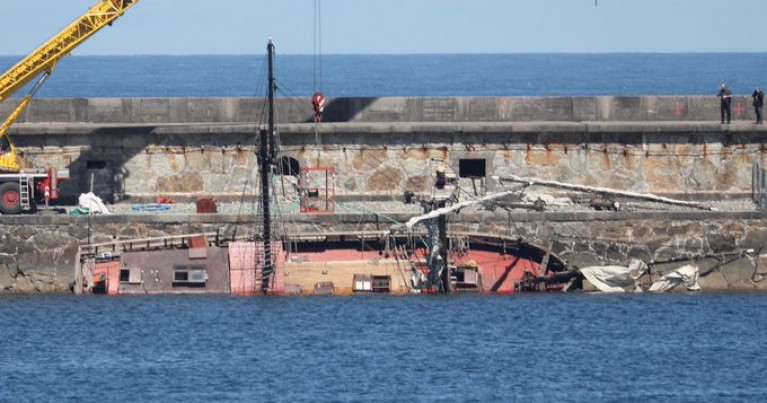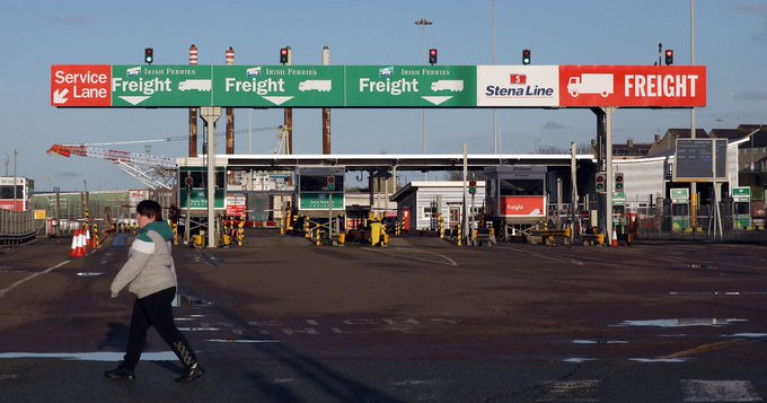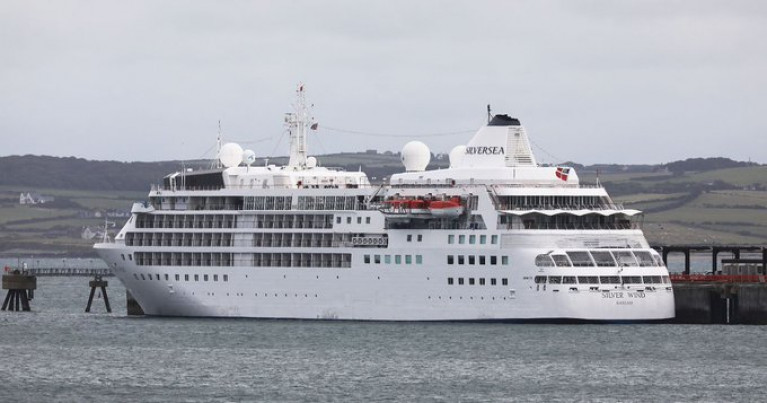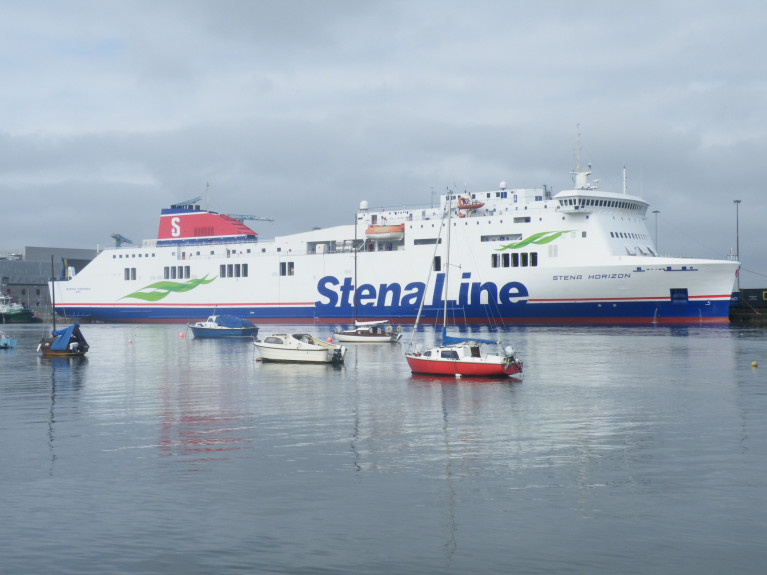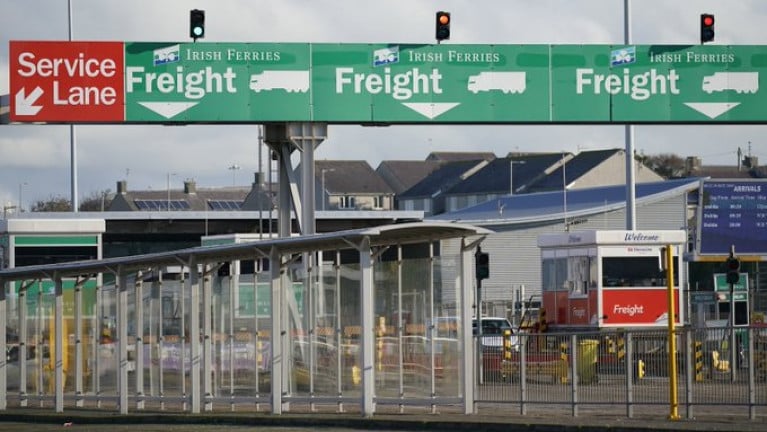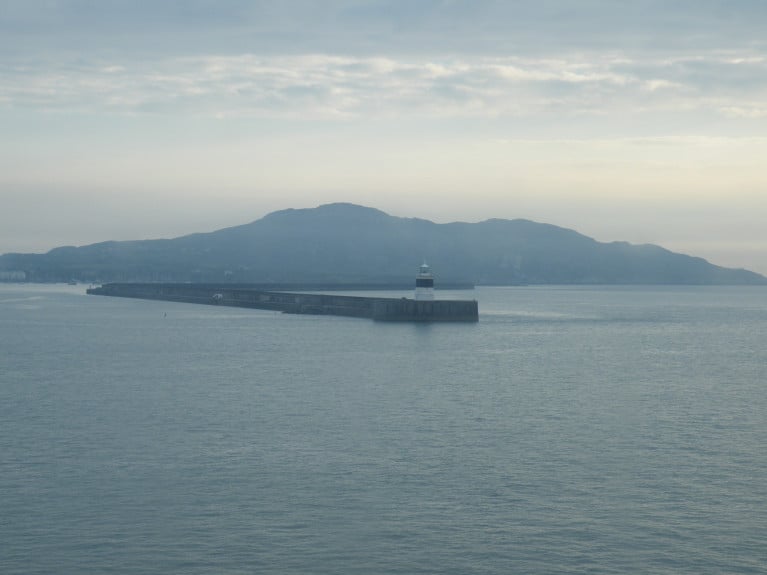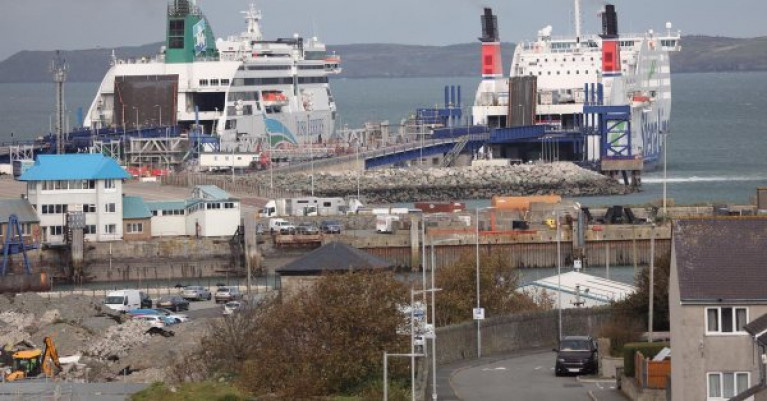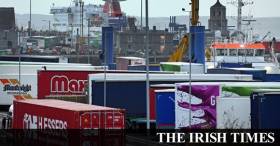Displaying items by tag: Holyhead
In Holyhead, a stricken tall ship which ran aground last week at the north Wales port's breakwater is set to be dismantled.
It is understood that the 83-year-old tall ship Zebu has been too badly damaged to be salvaged.
A crane company is expecting to remove the two masts today with bad weather forecast.
As NorthWalesLive reported on Tuesday, the rest of the dismantling work is expected to be completed next week.
"It's very sad," said Mark Francis, of Bob Francis Crane Hire. "She's a piece of British nautical history.
"There will never be another one like her built again because the skills and crafts needed are being lost."
He added: "We are taking all the rigging and the masts off to stabilise the hull. We may have to stop then until next week because of a freshening blow."
More from the newspaper here.
Port of Holyhead Border Post Site Confirmed by Welsh Government
The ferry port of Holyhead has been confirmed by the Welsh Government for the site of a planned new Border Control Post (BCP).
Physical checks are required on certain goods entering the UK from the EU due to Brexit and the deal struck by the UK Government.
Further controls on imports are due to be introduced in phases this year by the UK Government.
Checks were due to be introduced in stages from 1 April and from 1 July, but most import checks have now been pushed back to January 1 2022.
Border Control Posts (BCPs), where the required physical inspections will take place, are being established across the UK.
At Holyhead inspections will be required on goods such as animals, plants and products of animal origin entering Wales from the Republic of Ireland. These checks are the responsibility of the Welsh Government and will be in place in order to ensure goods entering the UK do not pose a risk to public health, or to the spread of animal or plant diseases.
Welsh Government has announced that Plot 9 at Parc Cybi has been selected as the site for the post.
A planning consultation under a Special Development Order will begin shortly.
For much more reading on this development, NorthWalesLive reports including an image of the BCP plot site.
Cruise Ship Jetty at Holyhead Undergoes Upgrade Will Make it 'More Attractive' for Passengers
Cruiseships that had used the deep water jetty at the Port of Holyhead, NorthWalesLive reports, is now receiving an upgrade that will make it more attractive for passengers and prepare it for a new use.
Work has begun on the £500,000 upgrade of the Orthios jetty at Holyhead - currently being used as a base for sea trials and training by the world’s most advanced polar research vessel the RSS Sir David Attenborough (see pic-caption too).
The upgrade serves two purposes - including getting the jetty ready to receive plastics for recycling for Orthios' Plastics-to-Oil facilities at the former Anglesey Aluminium site.
It will also benefit Welsh tourism as Orthios said it will make the jetty "more attractive" to cruise ships when the holiday industry revives.
The improvement works are being managed for Orthios by Cadarn Consulting of Anglesey.
More on this story here and the newbuild polar research ship was off the North coast of Ireland recently.
Operator Stena Line Furlough Quarter of Dockers at Holyhead Port due to Brexit & Covid Hit
Ferry operator Stena Line has placed a quarter if its dock workers at Holyhead on furlough as Covid and Brexit hit demand for services.
The ferry giant, reports NorthWalesLive, has seen a slump in trade since January 1 due to several factors.
This includes the continued impact of the pandemic on passenger numbers, trade disruption due to Brexit and stockpiling in December.
It has seen some weekend services cancelled and next week Stena Estrid (see related story) will be replaced by the smaller Stena Horizon on the route.
This has sparked fears over the long term impact on Holyhead port with a surge in trade on direct Ireland/EU mainland services and a switch by some operators to direct Belfast routes for goods to and from Northern Ireland.
Port officials remain calm about the situation with confidence that these are short term impacts exacerbated by the pandemic.
But they have taken the decision to temporarily reduce staff numbers dockside with a 25% cut in port services operators.
These workers - who help to dock vessels and the ferries to load and unload - have been placed on the UK Government's Job Retention Scheme.
Further reading here on the reality of such developments.
Welsh Government Fears Brexit Delays Notably at Holyhead
A UK parliament committee has said it is deeply concerned that no decision has been made on the location of customs facilities for the ports of Holyhead, Fishguard and Pembroke - with just 21 days left before the end of the Brexit transition period.
The Port of Holyhead is the second busiest roll-on/roll-off freight ferry port in the UK (after Dover) and about half of the outbound freight from Dublin Port passes through it.
The confused state of customs preparation on the UK side could result in long delays for Irish truck drivers moving goods in and out of the country.
The Welsh government has prepared contingency plans in case facilities are not ready, including a plan to stack lines of trucks along the A55, which is the main road from the port that stretches across north Wales.
From 1 January, the UK will be outside the EU Customs Union and full customs procedures will apply to goods moving between Ireland and Great Britain.
The British government has decided to introduce customs and food safety checks in three phases between January and July mainly because the computer systems to process the extra customs paperwork are not ready and the physical facilities to carry out customs checks have not been built.
In a report published today, the Welsh Affairs Committee of the UK parliament said that even with a delay on introducing full scale customs checks until July, "there is an unacceptable level of risk that facilities will not be ready in either North or South West Wales for the full introduction of border checks and processes in July 2021".
For much more RTE reports on the Irish Sea routes and associated UK 'land-bridge'.
Holyhead: Freeport Status Gets Local MP's Backing
A Welsh MP has claimed the granting of a freeport status to the (ferry)port of Holyhead could “transform” the fortunes of the town and Anglesey as a whole.
The Government, writes NorthWalesLive, has already promised to create up to 10 freeports across the UK after Brexit.
Being included in such a free port zone would mean that they would be considered to be outside of the UK for customs purposes — meaning companies could import and export goods without paying the usual tariffs.
Chancellor Rishi Sunak is widely reported to be planning to open bidding for towns, cities and regions to become freeports in his autumn budget.
Such reports suggest the ports would be “fully operational” within 18 months of the UK leaving the customs union and single market at the end of this year.
Virginia Crosbie, in a pre-election pledge, promised to campaign for Holyhead to be given such status which she said would “put Holyhead on the international map” as well as “unleash hundreds of new, good quality jobs” and boost tourism.
For more on the north Wales ferryport (incl. the cruise sector) click here.
Holyhead Port Desperately Needs UK Gov. Cash During Covid-19 & What Could Happen If Not Backed
Additional financial support is needed to keep the Port of Holyhead’s ferry operators going during the Coronavirus pandemic, it has been claimed.
While some freight services continue between Wales and Ireland, the slashing of passenger services has led to calls for UK Government cash to bridge the gap between a drop in income and running costs of maintaining such an important strategic international transport and freight route between Dublin and Holyhead.
As a result, the leader of Anglesey Council has written to transport secretary Grant Shapps and Secretary of State for Wales Simon Hart to highlight her concerns on how it could affect the 400 workers based at the port.
Cllr Llinos Medi described the impact of coronavirus on the day-to-day operations of both Holyhead Port’s ferry operators – Stena Line and Irish Ferries – as “severe” with both having already curtailed services but remaining committed to maintaining transport of critical freight.
For much more click NorthWalesLive here
Adrenaline Junkies Will Love The All Wales Boat & Leisure Show 2020
Wales’ largest indoor watersport event takes place at the Anglesey Showground in Holyhead on 29-30 May next year.
The All Wales Boat & Leisure Show will feature the finest of personal watercraft and active watersport in a region that hosts some of the world’s best coastal waters and coastline, lakes, white water rivers and gorges.
The show connects together industry leaders in boat and leisure products and services across Wales, with not only watersport and boating enthusiasts but all those that have a passion for the great outdoors.
Discover a huge range of exhibitors, show events and activities where you can have a go, too — it’s a must-visit for boat owners, watersport lovers or families looking for a great day out.
Tickets are £10 for adults, £5 for children (under 4s free) and £20 for families, and also give access to the Anglesey Food Festival, Bangor Science Festival and Festival of Discovery.
#ferries - The Port of Holyhead has shown “no sense of emergency” about Brexit, while Dublin Port bemoaned the huge expense preparing for a no-deal exit that might not happen, the British-Irish Parliamentary Assembly heard.
As The Irish Times writes at the biannual gathering of Irish and UK parliamentarians heard details of a report from one of its committees on a visit to the two Irish Sea ports by a delegation from the assembly to assess preparations for Brexit.
The committee painted a contrasting picture on preparations being taken in Dublin and Holyhead.
Darren Millar, a Conservative member of the Welsh national assembly, said that Dublin Port officials expressed concern about the number of customs officials that still needed to be hired to deal with a potential no-deal Brexit.
“Our biggest concern was that there was huge effort and huge expense going into these things and they may not be required,” he said on Tuesday, the second day of the assembly at Druids Glen in Co Wicklow.
Further reading on this story can be read through this link.
Port of Holyhead Under threat from Breakwater Erosion
#ferries - BBC News writes that action is needed to repair damaged Victorian sea defences protecting a Welsh port, experts have warned.
Anglesey council has been told the 1.7 mile (2.4km) breakwater at Holyhead - the longest in Britain - is suffering from erosion to its rubble mound base.
Ferry company Stena Line which owns the structure estimated in 2013 that it was costing £150,000 a year in maintenance.
Consultations and a public meeting are being held to support the case for Welsh Government funding for repairs.
The Grade II-listed structure was opened in 1873 after 28 years of construction involving more than 1,300 workers.
Anglesey council said the rubble mound on which the wall stands has gradually been eroded by the constant wave action and could be breached within 15 years.
For more on this story click here.



























